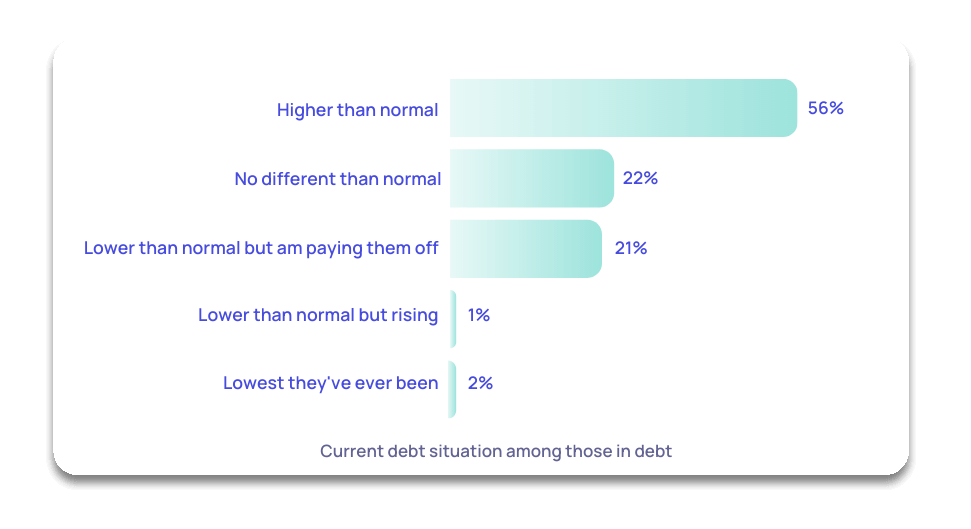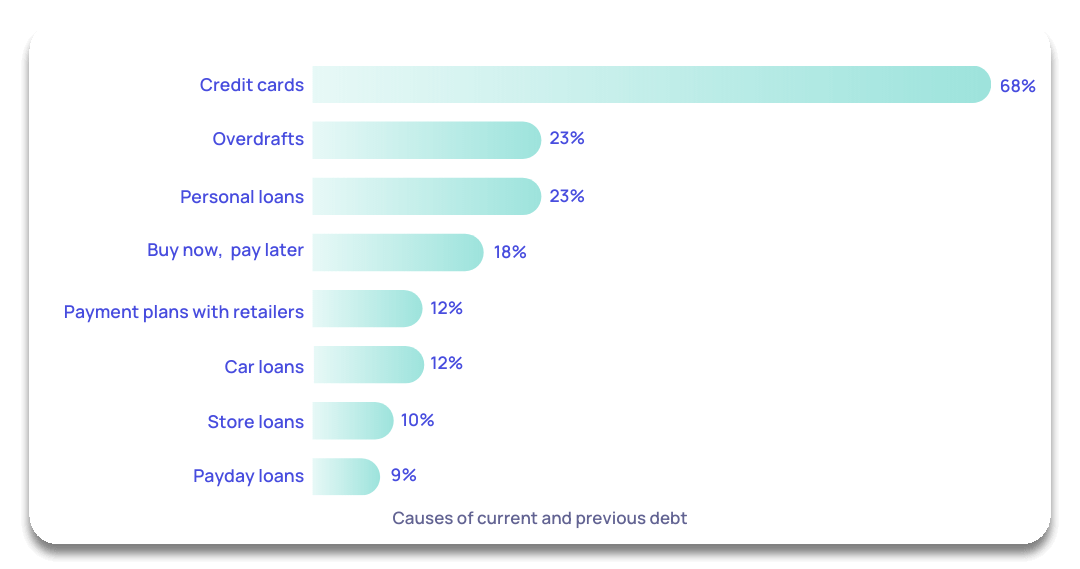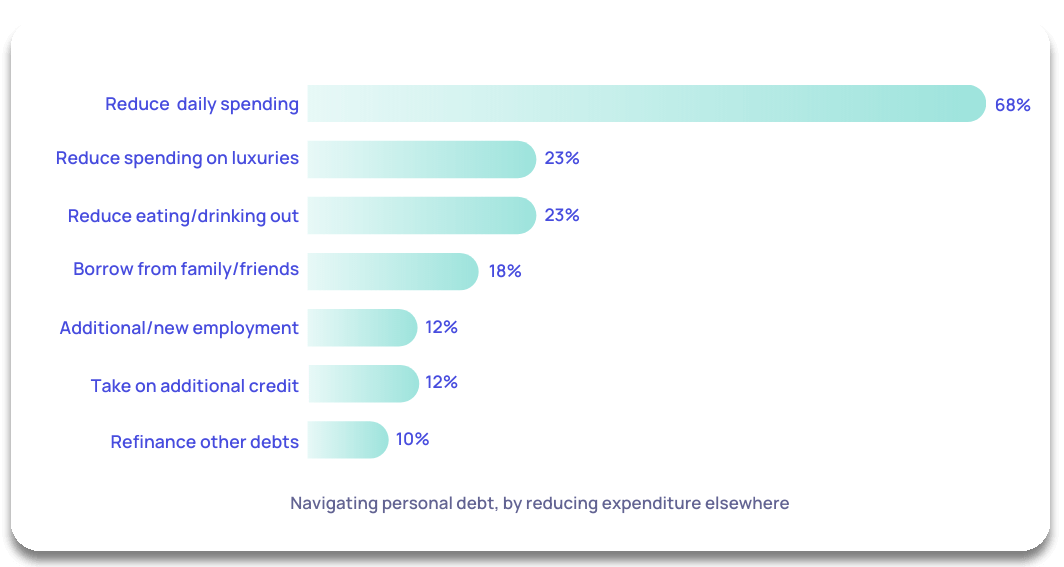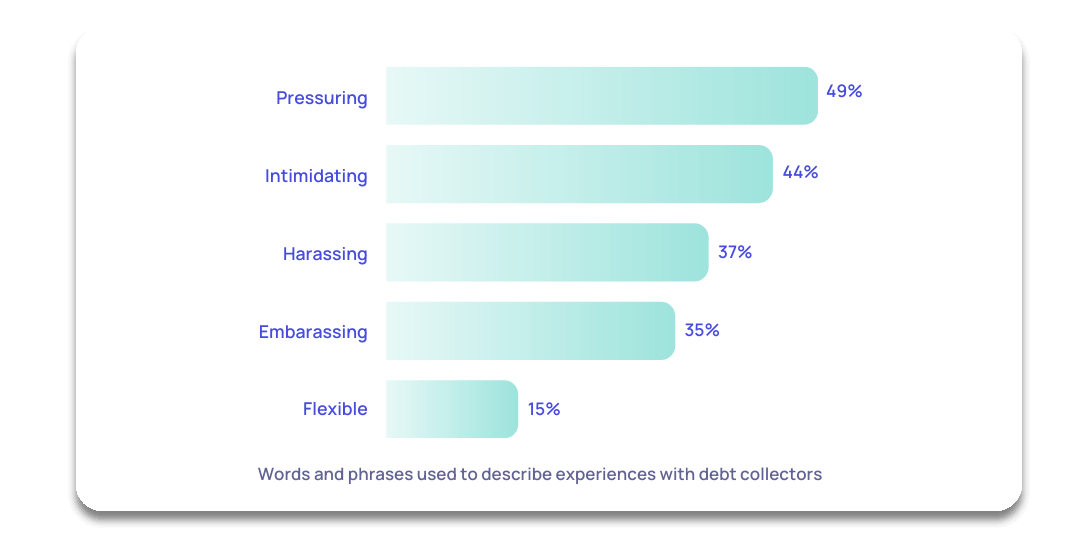As the cost of living crisis deepens, debt collection that places customer-outcomes at its core is more vital than ever
Following InDebted’s UK launch in May this year, we commissioned a report conducted by Opinium to survey 2,000 UK adults on their experience of debt. With the average total debt per household in the UK just over £64,000, we uncovered how Brits are impacted by today’s financial climate and their treatment by collection agencies.
How debt happens
- Average individual debt amount £6,313
- A quarter (26%) of Brits are currently in debt, rising to 37% amongst 35-54 year olds (most affected age group)

- 2 in 3 (64%) agree that it’s too easy to get into debt through credit products such as BNPL and credit cards

Drivers of UK debt
- Rising cost of energy bills (60%) is predicted to continue as the key driver
- Followed by increasing food costs (59%), rising interest rates (23%) and loss of job security and income (22%)
- 77% of UK adults agree that the increasing cost of living and its impact on their financial position is a cause for concern
Behind the stats: Ellie Tahzib, Chief Operating Officer
“A significant number of people around the world operate without a financial safety net, and the UK is no exception. Up to 30% of the population have no savings at all, causing increasing panic in difficult economic climates. In May, the CEO of the country’s largest energy firm (Eon) predicted that 40% of customers will be plunged into fuel poverty given exceptional increasing costs. Even with marginal salary increases, keeping up with the basics is no longer a given for most in the UK.
Where consumers in debt feel forced into high-pressure situations to repay outstanding balances as fast as possible, the most effective solution for both lenders and borrowers is for consumers to establish sustainable habits with money management - resulting in improved access to credit and social mobility.“
The experience of being in debt
- 2 in 5 (38%) are worried about debts increasing in 2022
- 49% of those who have struggled with debt have experienced loss of sleep due to concerns
- 34% have experienced poor mental health and decline in wellbeing because of debt, while 28% significantly reduced their social life

Behind the stats: Tim Collins, General Counsel “Financial wellbeing and mental health exist in a symbiotic relationship, with each holding power to exacerbate the other.
Even in the absence of collection agencies, the experience of debt is uncomfortable. Feelings of shame, loss of control, embarrassment and impact to self-esteem can significantly damage mental health and wellbeing - all in the midst of having to navigate difficult choices to manage finances.
A report published by StepChange found that 53% of UK adults say they would be reluctant to seek help with financial difficulty from a bank or credit firm. From a human perspective, debt can be an isolating place. At InDebted, we will continue to break the stigma that debt carries, making those tough conversations as painless, shameless and compassionate as possible.
With InDebted’s official entry into the UK it’s our job to turn an inherently taboo and difficult experience into one of empathy and convenience, putting the power back into the hands of consumers and sparking the journey to financial freedom.”
How can the industry better support consumers in debt?
- Nearly half (47%) of 18–34-year-olds have been contacted by a debt collection agency regarding a debt
- Nearly two thirds (64%) agree that being contacted by a debt collection agency was a stressful experience for them; increasing to 75% of 18–34-year-olds
- 49% claim to have encountered harassment or aggression from debt collectors and debt collection agencies

- 40% of respondents are worried about receiving phone calls or physical letters from debt collectors
- 52% of respondents who had currently or previously been in debt said they had been contacted by debt collectors using traditional non-digital methods, including sending letters (24%), making phone calls (20%), and bailiffs visiting their home (8%). In contrast, when asked, digital contact was the preferred option for over half (51%) of customers.
Behind the stats: Josh Foreman, CEO & Founder
“The negative perception of our sector, shown particularly by the 40% of Brits who worry about receiving calls or letters from collectors, is a troubling statistic, and evidences the need for serious change in our industry. These communication methods are outdated, inconvenient, and ineffective - and not in line with the needs of the increasingly digitally-savvy consumer.
We know that the most sustainable and fastest route to improving consumer outcomes when it comes to debt is to reject intrusive, aggressive, harmful tactics.
Instead, we give consumers the autonomy, flexibility and options to choose how they want to manage their debt. As the results show, over half would prefer this form of contact to methods such as letters.”
How can we support consumers during this time, while balancing commercial outcomes?
People are understandably concerned for their financial future. There’s a lot to juggle, with rising costs across almost all areas of day-to-day life, resulting in difficulty navigating expenditure and staying on top of bills. The impact this has on mental health and social wellbeing is huge - creating feelings of shame and anxiety, all of which is further exacerbated by the treatment people receive from debt collection agencies.
2 in 3 state that their experience with collectors has been ‘stressful’ and over half would prefer digital contact - it’s clear that the traditional debt collection industry needs to reconsider their tactics and dramatically shift their mindset - after all, the role of a debt collector isn’t to shame and harass, but to empower consumers with the autonomy to manage their financial position and get back on track in a way that works best for them.
The UK population is not alone in feeling the effects of rising inflation, changes to covid-emergency measures and global instability simultaneously. Life has changed around the world, and maintaining financial stability is a challenge faced by millions of people today. While businesses are feeling the impact of late or missed payments and overdue accounts, so are consumers feeling the pressure of staying on top of bills while navigating increasing cost of living.
The key to supporting both businesses and consumers during this challenging time lies in an intelligent, new approach to debt collection.
One that challenges everything the traditional industry is built on and places the customer at the heart of the process - with no shameful or harassing tactics, no outdated communication methods, and no pressure or intimidation.
Support consumers by engaging with them in a way that works for them, with empathy, data intelligence and convenience at its core, and you will see results.
Learn more about how InDebted’s intelligent platform supports commercial outcomes while providing a 5-star experience that supports your valuable customer relationships.
See how Collect worksJoin our newsletter for the latest collections insights

Thank you for subscribing!
Join our newsletter for the latest collections insights

Thank you for subscribing!
Share
Other resources
5 expert-backed tips for working with multiple collection agencies
Diversifying your collections panel can be a game changer for your organisation.AI debt collection vs. traditional methods: what's different?
While traditional debt collection is increasingly seen as out of touch, a new generation solution is disrupting the landscape — AI-powered debt collection. It puts the power back into customer’s hands, to manage their debt their way.Improving collections strategy by 30% with machine learning
Contacting customers digitally to recover overdue accounts is one way to improve your customer experience. But predicting how each customer prefers to engage, and adapting each step of their journey accordingly takes your collections to entirely new levels of personalisation.The state of financial wellbeing in Australia, the United Kingdom and the United States, and how collections can support
How are your consumers coping financially? See the state of financial wellbeing across key markets, featuring the latest insights and practical actions for supporting stretched customers.
